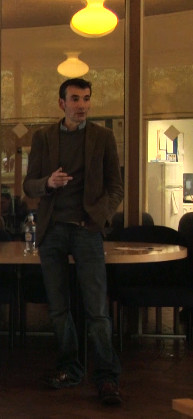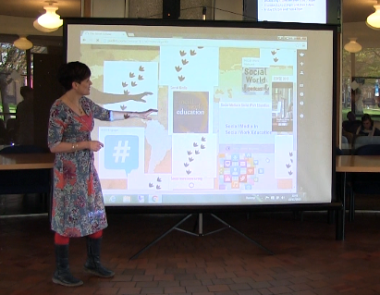Happy New Year to all our readers! Last autumn saw the start of the 2015/16 Technology Enhanced Learning seminar series, featuring three engaging sessions from four great speakers:
- Martin Hawksey (Chief Innovation, Community and Technology Officer for the Association for Learning Technology),
- Margaret Adamson (Head of Learning Technology & IT Skills Development at the University of St Andrews),
- Denise Turner (Lecturer in Social Work and Social Care at the University of Sussex),
- Tansy Jessop (Head of Learning and Teaching at the University of Winchester).
Learning Analytics: Gaining good actionable insight
The series kicked off in October with a talk from Martin Hawksey on learning analytics which provided insight into the possible challenges that we encounter and what we might expect for the future.
Martin described learning analytics as a continual process which is constantly being redefined and improved. Learning analytics can play a vital role in improving feedback loops, for example, observing the duration students spent watching videos to determine optimal video lengths, or examining quiz results to highlight common misconceptions.
Martin stressed that before concentrating upon data, analysis and action we must first think about what we are trying to find out, and what questions we need to ask.
Furthermore, we were told that data visualisations can be misleading, a human interface is needed to explain what it actually means. Perhaps the most important points Martin raised were the need to keep in mind the learners and tutors who are using the systems as well as the need to contextualise your data. There must be a pedagogy underpinning your learning analytics.
The Social Scholar
During our second seminar Margaret Adamson discussed the use of social media in academia, suggesting that implied judgements exist around the use of the word ‘social’ with a sense that it is fundamentally non-serious.
However, Margaret argued that social media has a huge part in play in in 21st century scholarship with its ability to collapse spatial and temporal barriers and extend reach, both of personal connections and research impact.
We were told of the many ways that tools can be used to:
- gather research data,
- connect with support networks,
- enable social bookmarking,
- collaborative writing,
- and illustrate impact.
Interestingly, Margaret also raised the question of whether we are using new tools to do the same thing or fundamentally changing what we are doing because of the affordances that technology gives us.
Margaret also advised us on potential issues, most interestingly the idea of what is happening to attribution as we share and reshare, how easy is it to find the original post?
Furthermore, it is important to be conscious of the dependence upon connectivity, for example wifi and battery, and the need to be willing to adapt to an ever-changing range of tools.
‘Home grown’ Denise Turner
During this seminar we were joined by Sussex’s own Denise Turner, a recipient of a University of Sussex Excellence in Teaching Award in 2015.
Denise talked to us about how experimenting with social media had opened up numerous opportunities for her, by extending professional connections, taking part in the Social Work Book Group and contributing to a book, ‘Smart Learning, teaching and learning with smart phones and tables in post compulsory education’ in collaboration with Andrew Middleton and the Media Enhanced Learning Special Interest Group (MELSIG).
Denise explained that social work has not always engaged with social media, with it being taught as something to be cautious of rather than exploring how it can be used to facilitate service users and enable people to build networks.
Denise’s research is aimed at addressing the need for an evidence base around what is actually happening within social media in the field.
Flipping the technology-pedagogy equation: principles to improve assessment and feedback

Tansy Jessop
The final seminar in December was delivered by Tansy Jessop who outlined two initiatives around assessment and feedback, TESTA (Transforming the Experience of Students through Assessment) and FASTECH (Feedback and Assessment for Students with Technology).
TESTA, an initiative that shifted perspective from the lecturer and their module to the student’s experience of the programme, initially started in four universities but has now expanded to more than 50, having been sustained well after the funding period.
Tansy stressed that during this project, formative assessments were required rather than optional and took the form of public assessments, for example presentations or posters, in order to motivate students.
FASTECH was concerned with how technology might be embedded into these programmes. The project funded 60 students who became ‘FASTECH fellows’ to research in partnership with staff to bring about enhancements around:
- assessment and feedback,
- student engagement,
- module evaluations.
Tansy explained how this initiative convinced senior management and the Students’ Union of the value of students in the role of enhancing learning and teaching.
Interested in the TEL Seminar Series?
To find out more, visit our website where you will find slides and video recordings of each seminar available to view. We’ll be announcing new seminar dates for Spring 2016 shortly.







[…] Read the full story by University of Sussex Technology Enhanced Learning Blog […]